| Poundbury | |
|---|---|
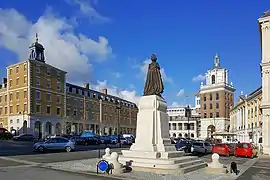 Queen Mother Square, with Strathmore House (right) | |
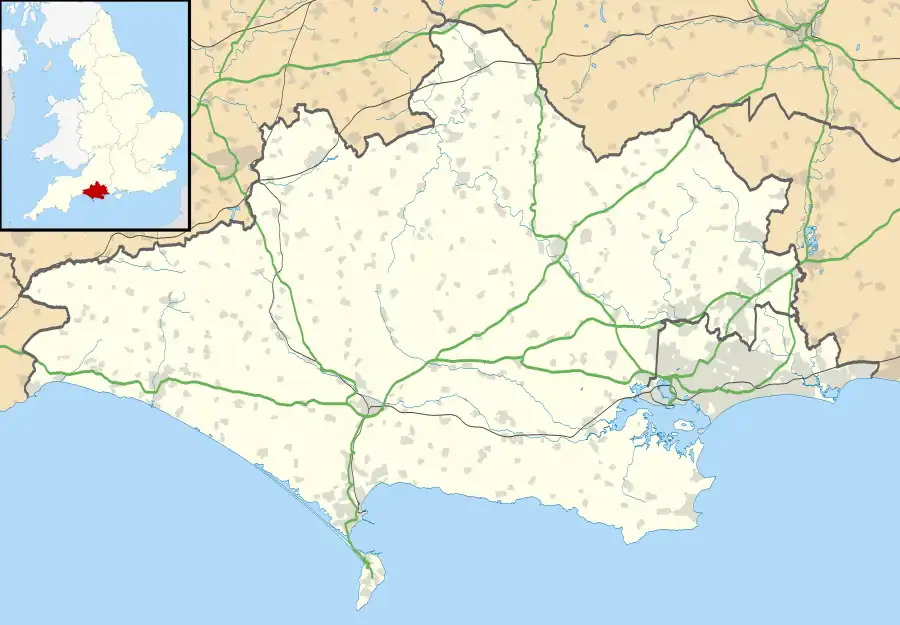 Poundbury Location within Dorset | |
| Population | 4,100 |
| OS grid reference | SY671549 |
| Civil parish | |
| Unitary authority | |
| Ceremonial county | |
| Region | |
| Country | England |
| Sovereign state | United Kingdom |
| Post town | DORCHESTER |
| Postcode district | DT1 |
| Dialling code | 01305 |
| Police | Dorset |
| Fire | Dorset and Wiltshire |
| Ambulance | South Western |
| UK Parliament | |
Poundbury is an experimental urban extension[1] on the western outskirts of Dorchester in the county of Dorset, England. The development is led by the Duchy of Cornwall, and had the keen endorsement of King Charles III when he was Prince of Wales and Duke of Cornwall. Under the direction of its lead architect and planner Léon Krier, its design is based on traditional architecture and New Urbanist philosophy. The 2021 census showed a population of 4,100.[2]
Due for completion in 2025, it is expected to house a population of 6,000. There are 2,000 people in more than 180 businesses engaged in its development and construction. Poundbury has been praised for reviving the low-rise streetscape built to the human scale[3][4][5] and for echoing traditional local design features, but it has not reduced car use, as originally intended. A 2022 report said: "Poundbury has been highlighted for its pedestrian and public transport links and not being as 'car-based' as other developments across the country."[6]
Mission
Poundbury has been built according to the principles of Charles III, who is known for holding strong views challenging post-war trends in town planning that were suburban in character. Since starting in 1993, the town has received both criticism and praise from architects and design critics.
The development is built to a high-density urban pattern, intent on creating an integrated community of shops, businesses, and private and social housing; there is no zoning. The planners claim they are designing the development around people rather than the car and aim to provide a high-quality environment. To avoid constant construction, utilities are buried in common utility ducts under the town. Common areas are maintained by a management company to which all residents belong. It consists of 35 percent social housing and is designed for sustainable development,[7] which includes carbon neutrality.[8]
To some degree, the project shows similarities with the contemporary New Urbanism movement. The development brief outlined having a centre built in a classical style and outer neighbourhood areas in a vernacular style, with design influences derived from the surrounding area.[9] The development includes period features such as wrought iron fences, porticos, gravelled public squares, and 'bricked-up' windows; known as blind windows, these traditionally serve an aesthetic function and are widely misattributed to the window tax.[10][11]
History

In 1987, the land was included in the West Dorset District Council local plan as a preferred location for development to expand the town of Dorchester. Charles III, the then-Prince of Wales and Duke of Cornwall, had already taken an interest in architecture and urban design, and was writing his book A Vision of Britain: A Personal View of Architecture. Seeing an opportunity to put the Prince of Wales's ideas into practice, the Duchy of Cornwall chose to lead on planning the development itself, rather than sell the land to an established housebuilder.[12] Driehaus Prize-winning New Classical architect Léon Krier was hired in 1988 to design the development.
Construction commenced in 1993,[13] and is expected to be complete around 2025, with the north-west quadrant being the last built. The final configuration is projected to support approximately 5,800 people.[14]
Greetings card entrepreneur Andrew Brownsword sponsored the £1 million development of the market hall at Poundbury, designed by John Simpson and based on early designs, particularly the one in Tetbury.[15]
As of 2018, Poundbury had a population of 3,500 residents.[16]
Economy and employment
.jpg.webp)
In 2010, Poundbury increased Dorset's county local economy contributing over £330 million; it is expected to contribute £500 million in the next 15 years.[18]
In 2010, more than 2,000 Poundbury residents were working in 180 local businesses. In 2017, the number of businesses increased to 185, providing 2,345 jobs.[19] Businesses include a Waitrose store, a technical company which produces parts for aeroplane wings, and a chocolate factory.
One notable local employer is the breakfast food manufacturer and exporter Dorset Cereals, which since 2000 has employed more than 100 people at its purpose-built barn factory.[20] Dorset Cereals moved to another location in Dorset in 2019.[21] Reportedly there is space for about 80 additional businesses.[22][23]
Education
Poundbury has two primary schools in the catchment area: The Prince of Wales and Damers First School. The latter was an existing school in Dorchester, but in 2017 relocated to Poundbury where a new school building was constructed.[24][25][26]
Demographics
The 2021 national census showed a population of 4,100.[27] In 2021, 89.5% of the population was born in the United Kingdom and 10.5% born outside.[28] The ethnic makeup of the town in 2021 was 93.7% (White British or White Other), 2.4% Asian, Asian British or Asian Welsh, 0.9% Black, Black British, Black Welsh, Caribbean or African, 2.6% Mixed or Multiple ethnic groups and 0.4% Other ethnic group.[29]
Attractions and landmarks
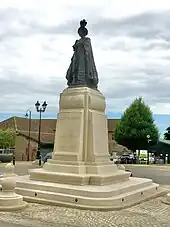
Due to Poundbury's unique appearance and plan, the town has been visited by architects, government officials, planners, housebuilders, and developers from around the world.[13]
The Queen Mother Square is surrounded by tourist attractions, such as Strathmore House, named in honour of King Charles' grandmother Queen Elizabeth The Queen Mother's paternal heritage. In 2016, the Queen Mother statue was unveiled at the square by Elizabeth II and her husband, Prince Philip, Duke of Edinburgh.[30] Also in 2016, a pub named the Duchess of Cornwall Inn was opened in honour of the wife of Charles III (then Prince of Wales), Queen Camilla.[31]
Every year in August, the Dorset Food & Arts Festival is held at Queen Mother Square attracting thousands of people. The festival showcases the town's fine produce and arts and also raises money for charities.[32][33][34]
In 2018, the Prince of Wales officially opened Poundbury's first church, the Dorchester Community Church.[35]
In May 2022, the Prince of Wales formally opened a huge play area in Poundbury's largest park, the Great Field.[36] The Great Field is now a park under the care of Dorchester Town Council.
Reception
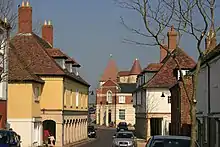
Poundbury's street plan and aesthetics have been variously praised and criticised by several commentators. Writing in Architect magazine, Professor Witold Rybczynski said that "Poundbury embodies social, economic, and planning innovations that can only be called radical."[37] Poundbury was intended to reduce car dependency and encourage walking, cycling, and public transport. A survey conducted at the end of the first phase, however, showed that car use was higher in Poundbury than in the surrounding (rural) former district of West Dorset;[38][39][17] but a 2022 report said "Poundbury has been highlighted for its pedestrian and public transport links and not being as 'car-based' as other developments across the country."[40]
Among the critics, Stephen Bayley described it as "fake, heartless, authoritarian and grimly cute".[41] In 2009, Dorchester Fire Station, designed by Calderpeel Architects, was shortlisted for the Carbuncle Cup award for ugly buildings.[42][43]
Nonetheless, the project has also received praise. In 2013, on the 20th anniversary of the project, the New Urbanist publication Better Cities and Towns wrote that it was "winning converts".[44] A few years later, British architecture and design critic Oliver Wainwright of The Guardian wrote, "Poundbury, the Prince of Wales's traditionalist village in Dorset, has long been mocked as a feudal Disneyland. But a growing and diverse community suggests it's getting a lot of things right." He argued that its main success was achieving genuine mixed-use development.[17] Countering criticisms of Poundbury's aesthetics, English philosopher Sir Roger Scruton praised the town for its commitment to pre-modern architectural and planning principles. In the BBC documentary Why Beauty Matters, Scruton exclaimed that
the proportions [of Poundbury] are human proportions; the details are restful to the eye. This is not great or original architecture, nor does it try to be; it is a modest attempt to get things right by following patterns and examples laid down by tradition. This is not nostalgia, but knowledge passed on from age to age.[45]
Gallery
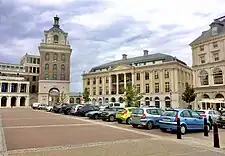 Queen Mother Square
Queen Mother Square Fire station by Calder Peel [46] (Dorset & Wiltshire Fire and Rescue Service)
Fire station by Calder Peel [46] (Dorset & Wiltshire Fire and Rescue Service)
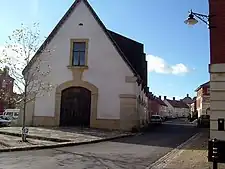 Brownsword Hall (side)
Brownsword Hall (side)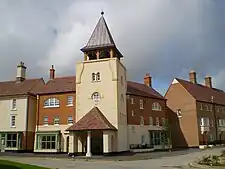 Peverell Ave W / Ringhill Street (Whistling Witch)
Peverell Ave W / Ringhill Street (Whistling Witch)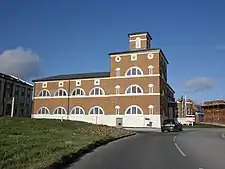 Peverell Ave W / Peninsula Way
Peverell Ave W / Peninsula Way Peverell Ave E / Woodlands Crescent
Peverell Ave E / Woodlands Crescent Holmead Walk / Chaseborough Square
Holmead Walk / Chaseborough Square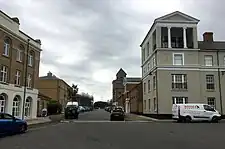 Bridport Road / Beechwood Lane
Bridport Road / Beechwood Lane Moraston Street / Weir End Road
Moraston Street / Weir End Road
See also
- Fairford Leys – a similar project located on the edge of Aylesbury
- Poundbury Hill – an Iron Age hill fort near Poundbury
- Driehaus Architecture Prize
- Knockroon – a similar project in Scotland
- Nansledan – a similar project with Duchy of Cornwall involvement beside Newquay
References
- Charles, Prince of Wales: A Vision of Britain: A Personal View of Architecture (Doubleday, 1989) ISBN 0-385-26903-X
- Leon Krier: Architecture: Choice or Fate (Andreas Papadakis Publishers, 1998) ISBN 1-901092-03-8
- Sandy Mitchell. "Prince Charles is not your typical radical." National Geographic. May 2006. Duchy of Cornwall @ National Geographic Magazine. Retrieved 9/14/06
Notes
- ↑ "Poundbury, Dorset - official guide to visiting, living or working in Poundbury". Poundbury.co.uk. Retrieved 20 December 2023.
- ↑ "Build a custom area profile Census 2021". Office of National Statistics. Retrieved 10 January 2024.
- ↑ Shields, Bevan (24 July 2021). "Prince Charles' experimental city is proving critics wrong". The Sydney Morning Herald. Retrieved 22 October 2021.
- ↑ Jones, Phil; Evans, James (14 May 2008). Urban Regeneration in the UK: Theory and Practice. SAGE. ISBN 978-1-4462-0229-6.
- ↑ "A history of Poundbury: The Masterplan". Poundbury.co.uk. Retrieved 31 October 2021.
- ↑ Welch, Lottie (18 February 2022). "Poundbury highlighted as 'visionary' development with residents not reliant on cars". Dorchester Nub News. Retrieved 9 October 2022.
- ↑ "About Poundbury". www.poundburycommercial.com. Retrieved 15 July 2018.
- ↑ Pentreath, Ben, How the Poundbury project became a model for innovation, Financial Times, 1 November 2013
- ↑ "Poundbury - What's not to like?". 30 April 2018.
- ↑ Niewitecki, Stefan (October 2017). "False Windows – Yesterday and Today". IOP Conference Series: Materials Science and Engineering. 245 (5): 052066. Bibcode:2017MS&E..245e2066N. doi:10.1088/1757-899X/245/5/052066. ISSN 1757-899X.
- ↑ Berman, Andrew (23 December 2011). "Blurring the Lines with Blind Windows".
- ↑ "A history of Poundbury: The Masterplan".
- 1 2 "How the Poundbury project became a model for innovation". Financial Times. Archived from the original on 10 December 2022. Retrieved 12 July 2018.
- ↑ Poundbury Factsheet 2019 poundbury.co.uk
- ↑ Worsley, Giles (30 January 2011). "A model village grows up gracefully". The Daily Telegraph. London, UK.
- ↑ "Prince of Wales visits Poundbury the 'town that Charles built'". ITV. 26 November 2018. Retrieved 31 July 2019.
- 1 2 3 "A royal revolution: is Prince Charles's model village having the last laugh?". The Guardian. 27 October 2016. Retrieved 12 July 2018.
- ↑ "Poundbury's £330million boost to local economy". 8 August 2010. Retrieved 8 January 2019.
- ↑ "Meeting the residents and businesses owners of Poundbury". Dorset.com. 27 March 2018. Retrieved 12 July 2018.
- ↑ "Dorset Cereals: Changing the world, one breakfast bowl at a time". The Independent. 28 June 2012.
- ↑ "Dorset Cereals reveals £5.5m factory move". 26 April 2018.
- ↑ "Poundbury: A look at Prince Charles' sustainable village in Dorset, on its 30th birthday". Daily Telegraph. Retrieved 11 July 2018.
- ↑ "Queen visits Waitrose in Prince Charles's village Poundbury". Daily Telegraph. Retrieved 11 July 2018.
- ↑ "School build starts on Prince Charles's Poundbury estate". BBC. 2 January 2016. Retrieved 12 July 2018.
- ↑ "Work set to begin on £10million Poundbury school to replace Damers First School in Dorchester". dorsetecho.co.uk. 7 December 2015. Retrieved 12 July 2018.
- ↑ "Schools and education". celebratingpoundbury.co.uk. Archived from the original on 19 November 2017. Retrieved 18 July 2018.
- ↑ "Build a custom area profile Census 2021". Office of National Statistics. Retrieved 10 January 2024.
- ↑ "Build a custom area profile Census 2021". Office of National Statistics. Retrieved 10 January 2024.
- ↑ "Build a custom area profile Census 2021". Office of National Statistics. Retrieved 10 January 2024.
- ↑ "Queen Mother statue unveiled at Poundbury estate". BBC News. Retrieved 12 July 2018.
- ↑ "The Duchess of Cornwall Inn Opens in Poundbury". November 2016. Retrieved 12 July 2018.
- ↑ "Thousands go along to enjoy the fare at Dorset Food and Arts Festival in Poundbury". The Argus. Retrieved 12 July 2018.
- ↑ "Pounbury". dorsetfestival.org. Retrieved 12 July 2018.
- ↑ "Celebrate Dorset best at the Dorset food and art festival". Retrieved 12 July 2018.
- ↑ "Prince Charles in Poundbury today". Retrieved 21 December 2018.
- ↑ "Prince Charles officially opens Poundbury's new playground 'fit for a king'" https://www.dorset.live/news/dorset-news/gallery/photos-prince-charles-poundbury-playground-7048255
- ↑ Rybczynski, Witold (3 December 2013). Behind the Façade of Prince Charles's Poundbury.
{{cite book}}:|work=ignored (help) - ↑ Watson, G.; Bentley, I.; Roaf, S.; Smith, P. (2004). Learning from Poundbury. Research for the West Dorset District Council and the Duchy of Cornwall. Oxford Brookes University.
- ↑ "Stephen Bayley: I'll show you a real carbuncle, Charles". The Guardian. 7 December 2008. Retrieved 14 September 2020.
- ↑ "Poundbury highlighted as 'visionary' development with residents not reliant on cars". 18 February 2022.
- ↑ Bayley, Stephen (7 December 2008). "I'll show you a real carbuncle, Charles". The Guardian.
To visit Poundbury is to be delivered to the furniture floor of a provincial department store in 1954, translated into architecture. It is fake, heartless, authoritarian and grimly cute.
- ↑ "Behind the Façade of Prince Charles's Poundbury". Architect Magazine. Retrieved 25 April 2022.
- ↑ 2009-08-05T09:34:00. "Carbuncle Cup 2009 longlist unveiled". Building Design. Retrieved 27 July 2020.
{{cite web}}: CS1 maint: numeric names: authors list (link) - ↑ Steuteville, Robert (5 November 2013). "At 20, Poundbury is winning converts". Better Cities and Towns. Archived from the original on 10 November 2013.
- ↑ Lockwood, Louise (Director) (28 November 2009). Why Beauty Matters (Television production). United Kingdom: British Broadcasting Corporation. Event occurs at 50:02.
- ↑ Case study. Poundbury Fire Station britmet.co.uk
- ↑ "Poundbury, Dorchester, Dorset".